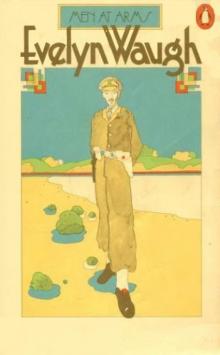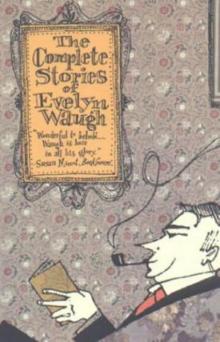- Home
- Evelyn Waugh
Men at Arms Page 15
Men at Arms Read online
Page 15
He paused. The regular officers and ‘Tubby’ Blake gave tongue: ‘Shake the bag.’
Slowly the terms of this noisy sport became clearer to Guy and he began making crosses on his card until there was a cry of ‘House’ from Captain Sanders, who then read his numbers aloud.
‘House correct,’ said the brigade major, and Sanders collected about nine shillings, and the other players crowded round the brigade major to buy new cards.
They played for two hours. The Brigadier’s eye teeth flashed like a questing tiger. As the players began to grasp what was going on, an element of enjoyment just perceptible warmed them here and there. The Brigadier became more jolly. ‘Who wants one number?’
‘Sir.’
‘Sir.’
‘Sir.’
‘What do you want?’
‘Eight.’
‘Fifteen.’
‘Seventy-one.’
‘Well it’s ….’ Pause. The Brigadier made a pantomime of being unable to read it; fixed the card with his monocle. ‘Did someone say they wanted seventy-one. Well it is seventy…’ pause ‘seven. All the sevens and we’ll...’
‘Shake the bag.’
At half past ten the Brigadier said: ‘Well, gentlemen, Bedfordshire for you. I’ve got work. You haven’t got a training programme yet.’
He led his staff away into the room marked ‘Bde. HQ’. It was two o’clock when Guy heard them disperse.
The Training Programme followed no text-book. Tactics as interpreted by Brigadier Ritchie-Hook consisted of the art of biffing. Defence was studied cursorily and only as the period of reorganization between two bloody assaults. The Withdrawal was never mentioned. The Attack and the Element of Surprise were all. Long raw misty days were passed in the surrounding country with maps and binoculars. Sometimes they stood on the beach and biffed imaginary defenders into the hills; sometimes they biffed imaginary invaders from the hills into the sea. They invested downland hamlets and savagely biffed imaginary hostile inhabitants. Sometimes they merely collided with imaginary rivals for the use of the main road and biffed them out of the way.
Guy found that he had an aptitude for this sort of warfare. He read his map easily and had a good eye for country. When townsmen like Sarum-Smith gazed blankly about them Guy could always recognize ‘dead ground’ and ‘covered lines of approach’. Sometimes they worked singly, sometimes in ‘syndicates’. Guy’s answers usually turned out to be the ‘staff solution’. At night when they were dropped about the downs, with compass bearings to guide them to a meeting-place, Guy was usually home one of the first. There were great advantages in a rural upbringing. In the ‘discussion’, too, he did well. These were debates on the various more recondite aspects of biffing. The subjects were announced beforehand with the implication that the matter should be given thought and research. When the evening came most were drowsy and Apthorpe’s fine show of technical vocabulary fell flat. Guy spoke up clearly and concisely. He realized that he was once more attracting favourable notice.
The thaw gave place to clear, cold weather. They returned to Mudshore range but with the Brigadier in charge. This was a period before the invention of ‘Battle Schools’. The firing of a live round, as Guy well knew, was attended with all the solemnity of a salute at a funeral, always and everywhere, except when Brigadier Ritchie-Hook was about. The sound of flying bullets exhilarated him to heights of levity.
He went to the butts to organize snap-shooting. Markers raised figure-targets at unpredictable points drawing bursts of Bren fire. The Brigadier soon tired of this, put his hat on his stick and ran up and down the trench, raising, lowering, waving it, promising down the telephone a sovereign to the man who hit it. All missed. Enraged he popped his head over the parapet shouting: ‘Come on, you young blighters, shoot me.’ He did this for some time, running, laughing, ducking, jumping, until he was exhausted though unwounded.
It was a period when ammunition was short. Five rounds a man was the normal training allowance. Brigadier Ritchie-Hook had all the Brens firing at once, continuously, their barrels overheated, changed, plunged sizzling into buckets of water, while he led his young officers on all fours in front of the targets a few inches below the rain of bullets.
2
THE newspapers, hastily scanned, were full of Finnish triumphs. Ghostly ski-troops, Guy read, swept through the sunless Arctic forests harassing the mechanized divisions of the Soviet who had advanced with massed bands and portraits of Stalin expecting a welcome, whose prisoners were ill-equipped, underfed, quite ignorant of whom they were fighting and why. English forces, delayed only by a few diplomatic complications, were on their way to help. Russian might had proved to be an illusion. Mannerheim held the place in English hearts won in 1914 by King Albert of the Belgians. Then quite suddenly it appeared that the Finns were beaten.
No one at Kut-al-Imara House seemed much put out by the disaster. For Guy the news quickened the sickening suspicion he had tried to ignore, had succeeded in ignoring more often than not in his service in the Halberdiers; that he was engaged in a war in which courage and a just cause were quite irrelevant to the issue.
That day Apthorpe said: ‘After all it’s only what one expected.’
‘Did you, Apthorpe? You never told me.’
‘Stuck out a mile, old man, to anyone who troubled to weigh the pros and cons. It was simply the case of Poland over again. But there was no point in talking about it. It would only have spread alarm and despondency among the weaker brethren. Personally I can see quite a few advantages in the situation.’
‘What, for instance?’
‘Simplifies the whole strategy, if you know what I mean.’
‘Am I to take this as part of your campaign to prevent alarm and despondency?’
‘Take it how you like, old man. I’ve other things to worry about.’
And Guy at once knew that there must have been a new development in the tense personal drama which all that Lent was being played, against the background of the Brigadier’s training methods which, indeed, drew all its poignancy from them and itself formed their culminating illustration.
This adventure had begun on the first Sunday of the new regime.
The school-rooms were almost deserted that afternoon; everyone was either upstairs asleep or else in the town. Guy was reading his weekly papers in the hall when he saw through the plate-glass window a taxi drive up and Apthorpe emerge carrying, with the help of the driver, a large square object, which they placed in the porch. Guy went out to offer his help.
‘That’s all right, thank you,’ said Apthorpe rather stiffly. ‘I’m just shifting some of my gear.’
‘Where d’you want to put it?’
‘I don’t quite know yet. I shall manage quite well, thank you.’
Guy returned to the hall and stood in the window gazing idly out. It was getting too dark to read comfortably and the man had not yet appeared to put up the black-out screens. Presently he saw Apthorpe emerge from the front door into the twilight and begin furtively burrowing about in the shrubbery.
He watched fascinated until some ten minutes later he saw him return. The front porch opened directly into the hall. Apthorpe entered backwards dragging his piece of gear.
‘Are you sure I can’t help?’
‘Quite sure, thank you.’
There was a large cupboard under the stairs. Into this Apthorpe with difficulty shoved his burden. He removed his gloves and coat and cap and came with an air of unconcern to the fire saying: ‘The Commodore sent you his compliments. Says he misses us at the Club.’
‘Have you been there?’
‘Not exactly. I just dropped in on the old man to fetch something.’
‘That piece of gear?’
‘Well, yes, as a matter of fact.’
‘Is it something very private, Apthorpe?’
‘Something of no general interest, old man. None at all.’ At that moment the duty servant came in to fix the black-out. Apthorpe said: ‘Smethers.�
�
‘Sir.’
‘Your name is Smethers, isn’t it?’
‘No, sir. Crock.’
‘Well, never mind. What I wanted to ask you was about the offices, the back-parts of the house.’
‘Sir?’
‘I need some sort of little shed or store-house, a gardener’s hut would do, a wash-house, dairy, anything of that kind. Is there such a place?’
‘Was you wanting it just for the moment, sir?’
‘No, no, no. For as long as we’re here.’
‘Couldn’t say, I’m sure, sir. That’s for the Q.M’
‘Yes. I was only wondering,’ and when the man had gone: ‘Stupid fellow that. I always thought he was called Smethers.’
Guy turned back to his weekly papers. Apthorpe sat opposite him gazing at his boots. Once he got up, walked to the cupboard, peered in, shut it and returned to his chair.
‘I can keep it there, I suppose, but I can’t possibly use it there, can I?’
‘Can’t you?’
‘Well, how can I?’
There was a pause during which Guy read an article about the inviolability of the Mikkeli Marshes. (These were the brave days before the fall of Finland.) Then Apthorpe said:
‘I thought I could find a place for it in the shrubbery but it’s all much more open than I realized.’
Guy said nothing and turned a page of the Tablet. It was clear that Apthorpe was longing to divulge his secret and would shortly do so.
‘It is no good going to the Q.M. He wouldn’t understand. It’s not exactly an easy thing to explain to anyone.’
Then, after another pause, he said: ‘Well, if you must know, it’s my thunder-box.’
This was far above Guy’s hopes; his mind had been running on food, medicine, fire-arms; at the very best he had hoped for something exotic in footwear.
‘May I see it?’ he asked reverently.
‘I don’t see why not, said Apthorpe. ‘As a matter of fact I think it will interest you; it’s pretty neat, a type they don’t make any more. Too expensive, I suppose.’
He went to the cupboard and dragged out the treasure, a brass-bound, oak cube.
‘It’s a beautiful piece of work really.’
He opened it, showing a mechanism of heavy cast-brass and patterned earthenware of solid Edwardian workmanship. On the inside of the lid was a plaque bearing the embossed title of Connelly’s Chemical Closet.
‘What do you think of it?’ said Apthorpe.
Guy was not sure of the proper terms in which to praise such an exhibit.
‘It’s clearly been very well looked after,’ said Guy.
It seemed Guy had said the right thing.
‘I got it from a High Court Judge, the year they put drains into the Government buildings at Karonga. Gave him five pounds for it. I doubt if you could find one for twenty today. There’s not the craftsmanship any more.’
‘You must be very proud of it’
‘I am.’
‘But I don’t quite see why you need it here,’
‘Don’t you, old man? Don’t you?’ A curiously solemn and fatuous expression replaced the innocent light of ownership that had until now beamed from Apthorpe. ‘Have you ever heard of a rather unpleasant complaint called “clap”, Crouchback?’
Guy was dumbfounded.
‘I say, what a beastly thing. I am sorry. I had no idea. I suppose you picked it up the other night in London when you were tight. But are you having it properly seen to? Oughtn’t you to go sick?’
‘No, no, no, no. I haven’t got it.’
‘Then who has?’
‘Sarum-Smith for one’
‘How do you know?’
‘I don’t know. I simply chose Sarum-Smith as an example. He’s just the sort of young idiot who would. Any of them might. And I don’t intend to take any risks.’
He shut his box and pushed it away under the stairs. The effort seemed to rile him.
‘What’s more old man,’ he said, ‘I don’t much like the way you spoke to me just now, accusing me of having clap. It’s a pretty serious thing, you know.’
‘I’m sorry. It was rather a natural mistake in the circumstances.’
‘Not natural to me, old man, and I don’t quite know what you mean by ‘circumstances’. I never get tight. I should have thought you would have noticed that. Merry, perhaps, on occasions, but never tight. It’s a thing I keep clear of. I’ve seen far too much of it.’
Apthorpe was up at first light next day exploring the outbuildings and before breakfast had discovered an empty shed where the school perhaps had kept bats and pads. There with the help of Halberdier Crock he installed his chemical closet and thither for several tranquil days he resorted for his comfort. It was two days after the fall of Finland that his troubles began.
Back from biffing about the downs and, after a late luncheon inclined for half an hour’s rest, Guy was disturbed by Apthorpe. He wore a face of doom.
‘Crouchback, a word with you.’
‘Well.’
‘In private if you don’t mind.’
‘I do mind. What is it?’
Apthorpe looked round the ante-room. Everyone seemed occupied.
‘You’ve been using my thunder-box.’
‘No, I haven’t.’
‘Someone has.’
‘Well, it isn’t me.’
‘No one else knows of it.’
‘How about Halberdier Crock?’
‘He wouldn’t dare.’
‘Nor would I, my dear fellow.’
‘Is that your last word?’
‘Yes.’
‘Very well. But in future I shall keep a look-out.’
‘Yes, I should.’
‘It’s a serious matter, you know. It almost amounts to pilfering. The chemical is far from cheap.’
‘How much a go?’
‘It isn’t the money. It’s the principle.’
‘And the risk of infection?’
‘Exactly.’
For two days Apthorpe posted himself in the bushes near his shed and spent every available minute on watch. On the third day he drew Guy aside and said. ‘Crouchback, I owe you an apology. It isn’t you who has been using my thunder-box.’
‘I knew that.’
‘Yes, but you must admit the circumstances were very suspicious. Anyway I’ve found out who it is, and it’s most disturbing.’
‘Not Sarum-Smith?’
‘No. Much more disturbing than that. It’s the Brigadier.’
‘Do you think he’s got clap?’
‘No. Most unlikely. Far too much a man of the world. But the question arises, what action ought I to take?’
‘None.’
‘It’s a matter of principle. As my superior officer he has no more right to use my thunder-box than to wear my boots.’
‘Well, I’d lend him my boots if he wanted them.’
‘Perhaps; but then, if you’ll forgive my saying so, you’re not very particular about your boots, are you, old man? Anyway you think it my duty to submit without protest.’
‘I think you’ll make a tremendous ass of yourself if you don’t.’
‘I shall have to think about it. Do you think I ought to consult the B.M.?’
‘No.’
‘You may be right.’
Next day Apthorpe reported: ‘Things are looking worse.’
It showed how much the thunder-box had occupied Guy’s thoughts that he at once knew what Apthorpe meant.
‘More intruders?’
‘No, not that. But this morning as I was coming out I met the Brigadier going in. He gave me a very odd look – you may have noticed he has rather a disagreeable stare on occasions. His look seemed to suggest that I had no business there.’
‘He’s a man of action’ said Guy. ‘You won’t have to wait long to know what he thinks about it.’
All day Apthorpe was distracted. He answered haphazard when asked an opinion on tactics. His solutions of the problems
set them were wild. It was a particularly cold day. At every pause in the routine he kept vigil by the hut. He missed tea and did not return until ten minutes before the evening lecture. He was red-nosed and blue-cheeked.
‘You’ll make yourself ill, if this goes on,’ said Guy.
‘It can’t go on. The worst has happened already.
‘What?’
‘Come and see. I wouldn’t have believed it, if I hadn’t seen it with my own eyes.’
They went out into the gloom.
‘Just five minutes ago. I’d been on watch since tea and was getting infernally cold, so I started walking about. And the Brigadier came right past me. I saluted. He said nothing. Then he did this thing right under my very eyes. Then he came past me again and I saluted and he positively grinned. I tell you, Crouchback, it was devilish.’
They had reached the hut. Guy could just see something large and white hanging on the door. Apthorpe turned his torch on it and Guy saw a neatly inscribed notice: Out of Bounds to all ranks below Brigadier.
‘He must have had it specially made by one of the clerks,’ said Apthorpe awfully.
‘It’s put you in rather a fix, hasn’t it?’ said Guy.
‘I shall send in my papers.’
‘I don’t believe you can in war-time.’
‘I can ask for a transfer to another regiment.’
‘I should miss you, Apthorpe, more than you can possibly believe. Anyway there’s a lecture in two minutes. Let’s go in.’
The Brigadier himself lectured. Booby traps, it appeared, were proving an important feature of patrol-work on the Western front. The Brigadier spoke of trip-wires, detonators, anti-personnel mines. He described in detail an explosive goat which he had once contrived and driven into a Bedouin encampment. Seldom had he been more exuberant.
This was one of the evenings when there was no discussion or night exercise and it was generally accepted that those who wished might dine out.

 A Handful of Dust
A Handful of Dust Complete Stories of Eveyln
Complete Stories of Eveyln Brideshead Revisited
Brideshead Revisited Men at Arms
Men at Arms Black Mischief
Black Mischief When the Going Was Good
When the Going Was Good Officers and Gentlemen
Officers and Gentlemen Helena
Helena Unconditional Surrender
Unconditional Surrender The Ordeal of Gilbert Pinfold
The Ordeal of Gilbert Pinfold The Complete Stories Of Evelyn Waugh
The Complete Stories Of Evelyn Waugh